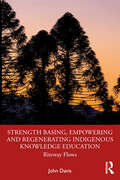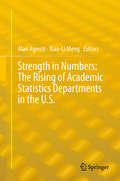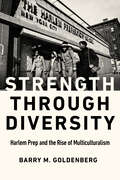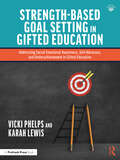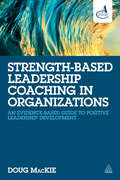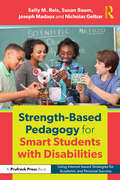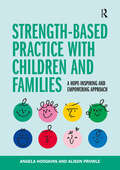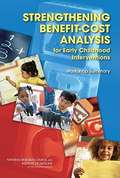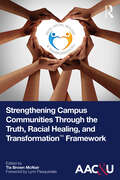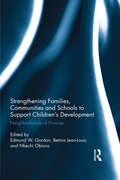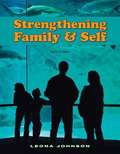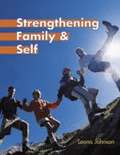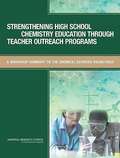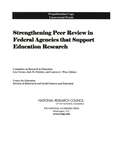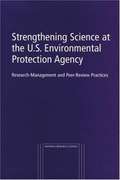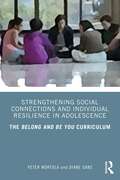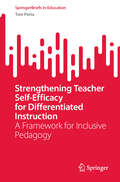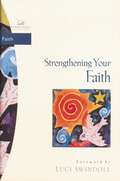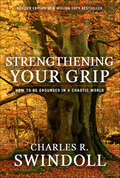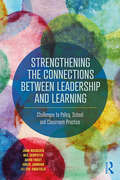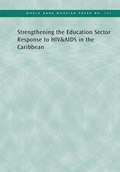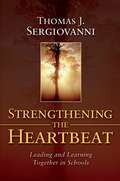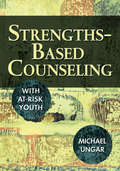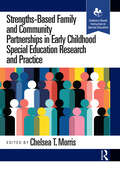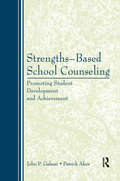- Table View
- List View
Strength Basing, Empowering and Regenerating Indigenous Knowledge Education: Riteway Flows
by John DavisStrength Basing, Empowering and Regenerating Indigenous Knowledge Education demonstrates how to bring Indigenous Knowledges to the forefront of education practice and provides educators with the tools to enact culturally responsive curricula and pedagogies, ensuring positive educational outcomes for Aboriginal and Torres Strait Islander children and students. In this book, John Davis presents Indigenous Knowledges – ways of doing, creating, and learning – combined with contemporary education practice, to develop a culturally responsive pedagogy that builds on the strengths that Indigenous Australian students bring to the classroom. Setting Cultural Proficiency as the benchmark, the book offers educators a lens through which to review their education practice. It moves beyond the deficit model of Indigenous education by challenging non-Indigenous educators to reflect on personal biases and to raise their expectations of Indigenous students. Not ‘tacked on’ to an existing curriculum, or specific to a single school term or unit of learning, Riteway places Indigenous Knowledges at the centre of education. The approach is holistic and adaptable to any educational context, from the early years right through to tertiary education. Providing a roadmap toward transformational education for Aboriginal and Torres Strait Islander children and students, this book will be essential reading for pre- and in-service educators alike.
Strength in Numbers: The Rising of Academic Statistics Departments in the U. S.
by Alan Agresti Xiao-Li MengStatistical science as organized in formal academic departments is relatively new. With a few exceptions, most Statistics and Biostatistics departments have been created within the past 60 years. This book consists of a set of memoirs, one for each department in the U.S. created by the mid-1960s. The memoirs describe key aspects of the department's history -- its founding, its growth, key people in its development, success stories (such as major research accomplishments) and the occasional failure story, PhD graduates who have had a significant impact, its impact on statistical education, and a summary of where the department stands today and its vision for the future. Read here all about how departments such as at Berkeley, Chicago, Harvard, and Stanford started and how they got to where they are today. The book should also be of interests to scholars in the field of disciplinary history.
Strength through Diversity: Harlem Prep and the Rise of Multiculturalism
by Barry M. GoldenbergFor nearly seven years, from 1967 to 1974, many hundreds of bright, college-going youth—most of whom had previously been labeled as high school “dropouts”—would proudly celebrate their graduation from Harlem Prep, a small educational experiment that grew to become a nationally renowned, cherished community institution in the iconic Black neighborhood of Harlem. Operating in a repurposed supermarket that used blackboards as classroom dividers, the school’s unique multicultural philosophy inspired all who stepped foot inside. This philosophy, exemplified by the school’s motto of “unity through diversity,” shaped the school’s ethos, fostered student achievement, and, most of all, made Harlem Prep distinct from any other educational institution, past or present. In Strength through Diversity, Barry M. Goldenberg shares the history of this one-of-a-kind multicultural institution from its rise to its apex and decline, revealing the collective stories of hope, struggle, and love from administrators, teachers, community members, and students. Using history as a blueprint, Goldenberg illustrates the untapped potential of multicultural education in the ongoing quest for educational equity.
Strength-Based Goal Setting in Gifted Education: Addressing Social-Emotional Awareness, Self-Advocacy, and Underachievement in Gifted Education
by Vicki Phelps Karah LewisThis must-have resource provides you with the tools needed to implement a strength-based approach for leading gifted and high-potential learners to Purposeful Empowerment in Goal Setting (PEGS). Expertly developed from Gagné’s (2021) DMGT Talent Development Model, PEGS incorporates self-regulation, self-reflection, and self-advocacy strategies into the goal-setting process for gifted and high-potential learners. Whether setting goals to address underachievement, twice-exceptional needs, or current or future aspirations, this book provides the guidelines and resources necessary to empower gifted learners to develop student agency and gain key insights into how their own social-emotional awareness impacts effective goal-setting. Gifted specialists, school counselors, classroom teachers, and academic coaches will find the ready-to-use forms, resources, tools, and strategies provided in this text an invaluable contribution toward their mission to guide and empower gifted and high-potential learners in the goal-setting and goal-achieving process.
Strength-Based Leadership Coaching in Organizations
by Doug MackiePositive organizational psychology, with its focus on the identification and development of strengths, is a natural ally to executive development and leadership coaching. However, this approach is only just beginning to come to the attention of organizations and consequently, the research base for strength-based coaching is in its early stages of development. Strength-based Leadership Coaching in Organizations reviews strength-based approaches to positive leadership development and evaluates the evidence for their effectiveness, critically assesses their apparent distinctiveness and considers how strengths can be reliably assessed and developed in their organizational context. Strength-based Leadership Coaching in Organizations reviews key areas of leader and team development and describes a model of strengths development in organizations. It discusses the application of strength-based leadership coaching from the managerial and external perspective within the context of career stage, seniority, role challenges and organizational need in order to facilitate meaningful change. Finally, it covers the limitations of the strength-based approach to leadership development together with the challenges of integrating positive leadership development. It shows exactly what a strengths focus is and that there is increasing evidence that this approach does get results. Where other books focus on one model of identifying strengths, this book offers a balanced and critical examination, showing how to apply a positive strength-based approach.
Strength-Based Pedagogy for Smart Students with Disabilities: Using Interest-based Strategies for Academic and Personal Success
by Sally M. Reis Joseph Madaus Nicholas Gelbar Susan BaumUsing the approach to teaching and developing strengths and talents known as the Schoolwide Enrichment Model (SEM) this book provides a blueprint on how to expand your repertoire of evidence-based practices and pedagogical strategies to better challenge and engage twice exceptional students. Covering topics such as how to provide various types of enrichment for the classroom, how to assess individual interests, how to use strength-based learning to promote socioemotional wellbeing, post-secondary transition, and more, this book offers practical advice, easily implemented strategies and real-life examples from evidence-based research to support educators in helping their students achieve both academic and personal success.Featuring various methods for providing various types of enrichment in the classroom as well as reproducible materials for immediate implementation, Strength-Based Pedagogy for Smart Students with Disabilities offers comprehensive assistance and support to educators and parents in their efforts to guide students and children toward academic and personal success.
Strength-based Practice with Children and Families
by Angela Hodgkins Alison ProwleStrength-based practice is an optimistic and empowering approach that is becoming increasingly popular in the education sector from early years to middle years and youth services. This book helps those working with children and families embed this approach in their practice to make a positive difference to children's lives.Intended for students and practitioners working with children and families, this book provides a practical guide, demonstrating how to identify strengths in the most challenging of situations and offers an optimistic and empowering approach using a diverse range of case studies. It is also relevant for those involved in SEND and social work. The study of strength-based practice has been widely used in the health and social care sector and is becoming more popular within the educational sector, aiming to fill a gap in training for future practitioners working with children and families. Using case studies and reflective questions, this book marries the practical and theoretical, demonstrating how to apply this knowledge in a variety of settings.
Strengthening Benefit-Cost Analysis for Early Childhood Interventions: Workshop Summary
by National Research Council Institute of Medicine of the National AcademiesThe deficiencies that many children experience from birth to school age--in health care, nutrition, emotional support, and intellectual stimulation, for example--play a major role in academic achievement gaps that persist for years, as well as in behavior and other problems. There are many intervention programs designed to strengthen families, provide disadvantaged children with the critical elements of healthy development, and prevent adverse experiences that can have lasting negative effects. In a climate of economic uncertainty and tight budgets, hard evidence not only that such interventions provide lasting benefits for children, their families, and society, but also that the benefits translate into savings that outweigh the costs is an extremely important asset in policy discussions. Convincing analysis of benefits and costs would provide a guide to the best ways to spend scarce resources for early childhood programs. Benefit-Cost Analysis for Early Childhood Interventions summarizes a workshop that was held to explore ways to strengthen benefit-cost analysis so it can be used to support effective policy decisions. This book describes the information and analysis that were presented at the workshop and the discussions that ensued.
Strengthening Campus Communities Through the Truth, Racial Healing, and Transformation Framework
by Tia Brown McNairThis edited volume encourages and informs the transformational steps needed for a better, more equitable future for all. These efforts, being led by higher education institutions, complement existing diversity, equity, and inclusion initiatives and are part of the W. K. Kellogg Foundation’s national Truth, Racial Healing, and Transformation™ effort.The American Association of Colleges and Universities is partnering with higher education institutions to develop TRHT Campus Centers dedicated to erasing barriers to equal treatment and opportunity on campuses, in communities, and throughout the nation at large. The narratives in this book include case study essay contributions from current TRHT Campus Centers that offer practical examples for translating the TRHT Framework into replicable strategies to inform constructive change. Contributions are drawn from a breadth of institution types including community colleges, liberal arts colleges, HBCUs, minority-serving institutions, faith-based institutions, regional comprehensives, and large research universities.Timely, powerful, and well-supplied with practical strategies, this book is an ideal guide for any college educator interested in diversity, equity, inclusion, and belonging; student leadership development; and models for institutional, structural, and systemic change.
Strengthening Families, Communities, and Schools to Support Children's Development: Neighborhoods of Promise
by Edmund W. Gordon Betina Jean-Louis Nkechi ObioraDrawing on a range of contexts influenced by the Promise Neighborhoods Program—a federal place-based initiative to improve educational outcomes for students in distressed urban and rural neighborhoods—this book outlines effective characteristics and elements for implementing supplementary education. Chapter authors demonstrate that the disparities in educational achievement between white and non-white students can only be addressed by a holistic approach that takes the communities in which schools are situated as its focal point. This edited collection distills the insights gained from the communities implementing such comprehensive education programs and provides the framework and models for reproducing such successes.
Strengthening Family & Self
by Leona Johnson- New suggested chapter activities--Think Critically, Connect with Your Community, and Use Technology--help students apply their learning. <BR>- Learning objectives, key terms, summary, case studies, and review questions enrich each chapter.
Strengthening Family & Self
by Leona JohnsonThis book is designed to encourage personal growth and strong family relationships.
Strengthening High School Chemistry Education Through Teacher Outreach Programs: A Workshop Summary To The Chemical Sciences Roundtable
by National Research Council of the National AcademiesA strong chemical workforce in the United States will be essential to the ability to address many issues of societal concern in the future, including demand for renewable energy, more advanced materials, and more sophisticated pharmaceuticals. High school chemistry teachers have a critical role to play in engaging and supporting the chemical workforce of the future, but they must be sufficiently knowledgeable and skilled to produce the levels of scientific literacy that students need to succeed. To identify key leverage points for improving high school chemistry education, the National Academies' Chemical Sciences Roundtable held a public workshop, summarized in this volume, that brought together representatives from government, industry, academia, scientific societies, and foundations involved in outreach programs for high school chemistry teachers. Presentations at the workshop, which was held in August 2008, addressed the current status of high school chemistry education; provided examples of public and private outreach programs for high school chemistry teachers; and explored ways to evaluate the success of these outreach programs.
Strengthening Peer Review In Federal Agencies That Support Education Research
by Committee on Research in EducationInformation on Strengthening Peer Review In Federal Agencies That Support Education Research
Strengthening Science at the U.S. Environmental Protection Agency: Research-Management and Peer-Review Practices
by Committee on Research Peer Review in EPAInformation on Strengthening Science at the U.S. Environmental Protection Agency
Strengthening Social Connections and Individual Resilience in Adolescence: The Belong and Be You Curriculum
by Peter Mortola Diane GansThis book introduces a group counseling curriculum that provides both a foundation to confidently lead a counseling group for adolescents and inspiration for how a group leader can adapt and modify the text in a range of settings. The curriculum is three-fold, corresponding with the three major sections of the text. In Part One of the text, the authors provide a conceptual and practical way of understanding two matters: first, the critical leadership challenges faced by group counselors as well as the skills they need to navigate those challenges successfully, and second, the critical developmental challenges faced by adolescents and the skills they need to navigate those challenges successfully. Part Two introduces a nine-week social skills curriculum – Belong and Be You – designed and modified over ten years of use to help adolescents be better socially connected as well as confidently independent. Part Three provides an additional resource which is meant to be used in tandem with the curriculum: 40 strategic stories on four different themes contributed by faculty and students. This book will benefit school counselors and group counselors working with adolescents to successfully navigate group leadership and help students embrace themselves and find belonging.
Strengthening Teacher Self-Efficacy for Differentiated Instruction: A Framework for Inclusive Pedagogy (SpringerBriefs in Education)
by Tom PortaThis book offers a comprehensive exploration of the theoretical underpinnings and practical implications of differentiated instruction. By fostering a deeper understanding of the factors influencing the effective implementation of differentiation practices, the book seeks to empower educators to create inclusive learning environments that cater to student diversity. In doing so, it can shape pedagogical practices and inform policy decisions on a global scale, thereby advancing the cause of inclusive education across diverse educational contexts. This book enriches the understanding of differentiated instruction by introducing a new framework focused on strengthening teacher self-efficacy in differentiation. Additionally, it highlights the importance of support from school leadership and colleagues in implementing differentiation successfully. Featuring extracts from participant interviews to immerse readers in the empirical data, it provides insights into the challenges and opportunities inherent in differentiated instruction. With its focus on developing practical strategies and frameworks for differentiation, the book holds significance for educators worldwide grappling with student diversity.
Strengthening Your Faith (Women of Faith Study Guide Series)
by Beverly WilsonThe Women of Faith Study Series helps you turn the laughter and lessons of Women of Faith conferences into a journey of growth shared by special friends. Whether or not you've attended a conference, you will appreciate the bonds that form as you join with other women linked together in friendship, prayer, joy, and faith. Each study will also lead you to a deeper love of the Bible and a greater appreciation of the power of God's Word. Each session includes six sections: A Moment for Quiet Reflection . . . Just for Fun - Knowing God's Heart . . . Praying Together - Friendship Boosters . . . Making it Real in Your Own Life. The leaders guide that's included makes it easy to facilitate weekly Bible studies that will nurture your knowledge of Scripture and your sense of God's presence in your life. Six Sessions Include -- The Women of Ill Repute: Extravagant Faith - Elizabeth: Intimate Faith - Sarah: Laughing Faith - Ruth: Obedient Faith - Mary Magdalene: Unwavering Faith - Martha: Obedient Faith
Strengthening Your Grip: How to be Grounded in a Chaotic World
by Charles R. SwindollOne of Charles R. Swindoll's most powerful works, Strengthen Your Grip has sold over one million copies. Now in paperback, this revised and updated edition speaks more eloquently today than ever before to a world coming apart at its seams.
Strengthening the Connections between Leadership and Learning: Challenges to Policy, School and Classroom Practice
by David Frost Sue Swaffield Greer Johnson Neil Dempster John MacBeathExamining a decade of research and practice, this book makes the case for a radical reappraisal of leadership, learning, and their interrelationship in educational policy. Discussing whether policy direction is progressively constraining the professionalism and initiative of teachers and school leaders, it challenges conventional understanding and argues the case for thinking differently about the way to lead learning. Based on the Leadership for Learning (LfL) Project, the book clarifies, extends, and refines LfL principles and practices, and their contribution to ameliorating some of the difficult conditions encountered in the contemporary educational policy environment. It starts by discussing the direction and influence of current education policy and its subsequent consequences; chapters then move on to explore the framing values informing the LfL Projects, particularly focusing on what they imply for commitments to social justice, children’s rights and breadth in student learning, and considering how to create favourable conditions for learning. Identifying a disconnect between seminal principles and the nature of day-to-day practice, Strengthening the Connections between Leadership and Learning challenges school policy and practice at national and local levels. It is an essential read for postgraduate students, especially those studying leadership in education, as well as for teachers and policymakers in schools.
Strengthening the Education Sector Response to HIV and AIDS in the Caribbean
by World BankThe Caribbean Region is second only to Africa in the impact of HIV and AIDS. The Caribbean Community (CARICOM) has responded to this challenge by promoting a multisectoral response to the epidemic. UNESCO has provided regional leadership in strengthening the education sector component of this response. In 2005, UNESCO launched, with CARICOM and the World Bank, a regioinal dialogue involving representatives of Ministries of Education, national HIV and AIDS coordinating councils, development partners, and regional institutions providing leadership in the HIV response, which led to the development and endorsement of a regional Proposal for Action: Accelerating the Education Sector Response to HIV and AIDS in the Caribbean Region. In June 2006, Ministers of Education and representatives of National AIDS AUthorities met in Port-of-Spain, Trinidad and Tobago, under the auspices of the CARICOM Council on Human and Social Development, and agreed to promote education sector leadership in addressing HIV and AIDS and to create a supportive policy and financial environment at national and regional levels. This report describes the development of these regional processes and how they have led to a stronger education sector response at the regional level. It also focuses on developments in three countries (Guyana, Jamaica, and St. Lucia) as examples of how this regional effort translates into action at the national level.
Strengthening the Heartbeat
by Thomas J. SergiovanniStudy after study has concluded that no matter how competently managed a school may be, it is the bringing together of leadership and learning that makes the difference between ordinary and extraordinary performance.? Strengthening the Heartbeat offers leaders a clear and compelling way to help their schools achieve extraordinary results.? The proven principles outlined in this book can help any school build a culture of leadership and learning.? Thomas J. Sergiovanni?a leading thinker in the educational leadership arena?shows how a strong heartbeat is a school's best defense against the obstacles leaders face as they work to change schools for the better.? But strengthening the heartbeat of schools requires that we rethink what leadership is, how leadership works, what leadership's relationship is to learning, and why we need to practice both leadership and learning together.?Filled with illustrative examples, Strengthening the Heartbeat shows how to build trust that leads to the creation of a vision and the building of a covenant that brings together principals, teachers, parents, and students to honor shared values, goals, and beliefs.? When leaders are able to strengthen the heartbeat, their schools become stronger and more resilient.? These qualities help leaders to share the burdens of leadership with others, to create collaborative cultures, and to be continuous learners.? Leadership inevitably involves change and change inevitably involves learning.? Using this book, school leaders will have the tools they need to make their schools the best they can be.
Strengths-Based Counseling With At-Risk Youth
by Dr Michael UngarThis resource offers counseling strategies to promote adolescents' overlooked strengths and create healthy alternatives to problem behaviors such as bullying, drug use, violence, and promiscuity.
Strengths-Based Family and Community Partnerships in Early Childhood Special Education Research and Practice (Evidence-Based Instruction in Special Education)
by Chelsea T. MorrisThis comprehensive edited collection provides early childhood education and early childhood special education providers and researchers with strengths-based strategies for young children in infant, toddler, and preschool settings. It focuses on meaningfully working with families and communities to promote children’s social, emotional, behavioral, and mental health well-being.Moving away from deficit-based views and reframing how educators and researchers can respond to behavior that is perceived as challenging, the book begins with an overview of family-centered practices, the negative impact of exclusionary discipline, and theoretical models for understanding behavior and partnerships. Then the chapters detail how to recognize and build on family and community strengths, reduce suspensions and expulsions, and promote strengths-based teacher training and research collaborations. The book also discusses research, practice, and policy approaches that support children with disabilities, emphasizing the importance of family and community in intervention processes.Strengths-Based Family and Community Partnerships in Early Childhood Special Education Research and Practice is key reading for early childhood professionals, pre-service teacher educators, and researchers.
Strengths-Based School Counseling: Promoting Student Development and Achievement
by JohnP. GalassiDespite calls for a more preventive and developmental mode of functioning, school counseling has tended to be driven by a reactive and sometimes crisis orientation. Like social workers and school, counseling, and clinical psychologists, school counselors typically function to alleviate deficits, often in a small percentage of the students they serve. Although this orientation has served school counselors well in many instances, it is not empowering, it does not serve all students, and it does not replace those deficits with the type of positive characteristics and abilities that schools are attempting to develop. This is the first book to provide a comprehensive look at the theory, research, and intervention strategies that comprise a strengths-based, developmental approach to school counseling. In keeping with ASCA recommendations, the Strengths-Based School Counseling (SBSC) framework discusses academic, personal/social and career development outcomes for all students at the elementary, middle and secondary school levels. Other key features include: integrative framework�SBSC builds upon contemporary research from a variety of areas: school counseling, developmental psychology, school psychology, education, positive psychology, resiliency, and social work. evidence-based interventions�detailed examples of successful evidence-based interventions and environments are presented at the elementary, middle, and high school levels for each major developmental area (academic, personal/social, and career) identified in ASCA�s National Model. readability and pedagogy�beautifully written, the text includes lists of key points, tables of student strengths, illustrative examples, and student exercises.
